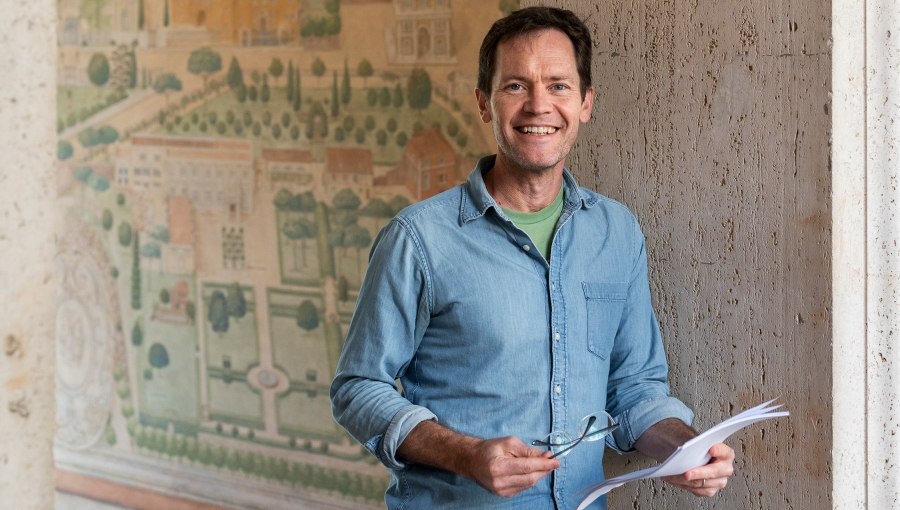Professor Stefan Lorenz Sorgner Publishes New Book On Transhumanism

Stefan Lorenz Sorgner On Transhumanism
JCU Professor Stefan Lorenz Sorgner published a new book titled On Transhumanism (Penn State University Press, 2020). Featuring an introduction for North American readers, this comprehensive overview of the cultural and philosophical movement of transhumanism is designed for both students of posthumanist philosophy and for general audiences interested in learning about the transhumanist movement.
The Web Communications Office had the opportunity to interview Prof. Sorgner about his book.
What is transhumanism and what is the biggest myth about it?
Transhumanism is a cultural movement, which affirms the use of technologies to transcend the current boundaries of human beings in order to increase our likelihood of living good lives. The concept was coined exactly 70 years ago (in 1951) by Julian Huxley, who was also the first Director of UNESCO. The movement has gained a lot of followers in the past decade, (e.g. Elon Musk, Ray Kurzweil, Aubrey de Grey), and is being dealt with in mass media, for example in the Netflix series Black Mirror. Unfortunately, transhumanism in public perception is often associated with the idea of “mind uploading”, as it is actively represented in the media by Elon Musk and others. This is a highly implausible thought, as we have no reason for claiming that life and, in particular, consciousness can exist in a silicon-based entity.
Using technologies in order to increase our healthspan and to fulfill the great diversity of human desires, wishes and fantasies is what we should focus on. This is what human beings have always been doing. The main tenet of transhumanism is based on the postulate that human beings have always been cyborgs. The word “cyborg” means cybernetic organism, whereby cybernetic, which comes from the ancient Greek “kybernetaes” (κυβερνήτης), means helmsman. Cyborgs are therefore controlled organisms. In philosophy, human beings were usually defined by their ability to speak and reason. Acquiring language is our first upgrade, provided to us by our caregivers. The process of “cyborgization” continues through the acquisition of new skills, such as learning mathematics, history, etc. However, a new dynamic is currently emerging through modern scientific discoveries. Control is being exponentiated, for example through genome editing (gene modification) and brain-computer interfaces.
What is your book about?
My new book is a primer on transhumanism. It presents a philosophically-informed understanding of transhumanism from various angles. It analyzes some moral questions on enhancement, explains how transhumanism relates to our cultural history, and introduces twelve pillars of philosophical debates that have occurred among transhumanists.
Six million years ago, our ancestors were great apes, and it was only 400 thousand years ago that the homo sapiens sapiens came into existence. It would be naïve to assume that the homo sapiens sapiens will still exist 6 million years from now. It should be in mankind’s best interest to transcend its current state because that will increase the likelihood of living good lives. Unfortunately, there are still too many people around who have yet not realized what a wonderful achievement the norm of negative freedom, i.e. the absence of constraint, could be. Each one of us should have the right to live in accordance with our idiosyncratic understanding of a good life. Sanctions should only be considered if harm is directly being done to another person, whereby the concept of the person should be open to include non-human animals.
Why is transhumanism relevant today?
A.I., and cyborg and gene technologies currently offer an enormous potential to radically alter who we are. They might even enable us to enhance evolution. The field of genetic engineering is particularly promising with regard to the potential for further human development. We are already in a position today to make selections following previous pre-implantation diagnoses as part of artificial insemination. The ethical, political, and legal framework is the reason why we are not yet doing what we are already technically capable of doing.
The other two decisive technical possibilities to support the autopoietic self-overcoming process are the promotion of human-machine interfaces and artificial intelligence. I consider the human-machine interfaces, in particular, to be of central importance for human development because smart cities need upgraded people. Computers are getting smaller in rapid steps. 25 years ago we had PCs. These are increasingly being replaced by smartphones. The next step on which companies are already working is to integrate computers into people. The monitor is then coupled directly to our optic nerves. We operate it by gesture control. The text input takes place directly through our thinking. The future of writing is thinking. The internet of things is thus supplemented by the internet of bodily things. Sensors of the integrated computer will be located in different parts of our body in order to be able to check our bodily functions.
Researchers at Tufts University have already developed a sensor that can be integrated into our teeth to monitor our food intake. Using these sensors and the permanent monitoring of our body, we can detect diseases not only when they are far advanced, but possibly even before they have begun to develop. Predictive maintenance is the name given to this process in machines. Predictive maintenance will also be possible in humans with the evolution of the internet of bodily things, a network of interacting chips located in the human body, which in turn will radically increase the human health span, the duration of a healthy life. Expanding human healthspan is a central goal of most transhumanists. I consider these visions of genetic development and the upgraded human being to be probable and promising.
Professor Sorgner will teach “Posthuman Studies: Philosophy, Technology, Media” PH/CMS 320 in the Spring.
Stefan Lorenz Sorgner teaches philosophy at John Cabot University in Rome and is director and co-founder of the Beyond Humanism Network, Fellow at the Institute for Ethics and Emerging Technologies (IEET) and Research Fellow at the Ewha Institute for the Humanities at Ewha Womans University in Seoul.





